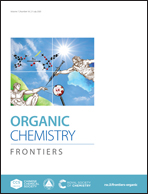Insights into Lewis base-catalyzed chemoselective [3 + 2] and [3 + 4] annulation reactions of MBH carbonates†
Abstract
Predicting the chemoselectivity of Lewis base-catalyzed annulations of Morita–Baylis–Hillman (MBH) carbonates is one of the most challenging questions in the organocatalysis field. The origin of chemoselectivity in Lewis base-catalyzed [3 + 4] and [3 + 2] annulations of MBH carbonates was theoretically explored in this work. The calculated results indicate that the general reaction pathway contains five steps: (1) nucleophilic addition on the α-carbon of MBH carbonates by a Lewis base, (2) dissociation of BocO−, (3) deprotonation of the α-carbon, (4) Michael addition, and (5) ring closure coupled with the dissociation of the Lewis base. The ring-closure step determines the chemoselectivity for the possible [3 + 4] and [3 + 2] annulation reactions. The chemoselectivity can be well predicted using frontier molecular orbital (FMO) analyses, which demonstrate that the different overlap modes of FMOs involved in ring-closure transition states control the chemoselectivity.
![Graphical abstract: Insights into Lewis base-catalyzed chemoselective [3 + 2] and [3 + 4] annulation reactions of MBH carbonates](/en/Image/Get?imageInfo.ImageType=GA&imageInfo.ImageIdentifier.ManuscriptID=D0QO00457J&imageInfo.ImageIdentifier.Year=2020)


 Please wait while we load your content...
Please wait while we load your content...